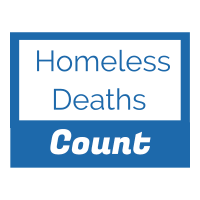More than 5,700 people experiencing homelessness died in 66 US cities and counties in 2018. This amounts to almost 16 people experiencing homelessness dying every single day. These death statistics represent the tip of the iceberg. Only about two percent of the 3,141 US counties are included in our dataset. Many jurisdictions fail to track housing status of decedents, leaving hundreds of community groups, including homeless service providers, religious organizations, and housing advocates, all over the country to keep track annually and memorialize these deaths.
On average, a person experiencing chronic homelessness has a life expectancy between 42 and 52 years. The average life expectancy in the US is approximately 79. These statistics are a grim reminder that homelessness kills. We know that people of color, especially Black and Indigenous people, people identifying as LGBTQ+, and people with disabilities are vastly overrepresented among the homeless population. They also comprise a disproportionate amount of homeless deaths.
Yet for all the data that highlights this pressing social problem, we must not forget that each statistic represents a life: a cherished child, a beloved sibling, or a loving parent. They died because our society failed them. Our system did not provide one of the most crucial platforms upon which we all build our lives: safe, affordable, and stable housing. All of these deaths are preventable, but to prevent them we must consistently make decisions at the ballot box, in our professions, and in our personal capacities that value life, especially the lives of our most vulnerable unhoused neighbors.
